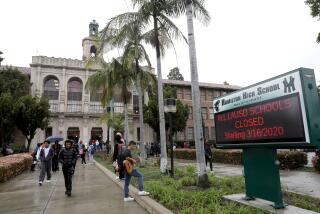RTD Tax Proposal for Subway Draws New Fire
- Share via
Irate downtown Los Angeles property owners Thursday attacked a revised RTD plan to borrow $200 million for construction of the Metro Rail subway and repay it by boosting their property tax bills when the first leg of the system opens in about five years.
About 75 property owners, many of them small businessmen who have joined a lawsuit against Metro Rail taxes, attended a downtown hearing that highlighted the continuing uncertainty of the financing plan for the first $1.25-billion leg of the subway months after construction has begun.
The Southern California Rapid Transit District board, after months of delays and revisions, is expected next week to authorize the issuance of bonds to help finance the project. But the bonds will not be sold until legal challenges to the special “Metrotax” fee are resolved in the next year or two.
Controversy Erupts
The controversy over the tax erupted late last year when many property owners near future Metro Rail stations received tax bills that had jumped 500% or more because of a new subway charge. The theory behind the tax is that properties will appreciate in value because of the subway and that owners should help pay for the special benefit they will receive.
In the face of earlier protests, the RTD board retreated, deferring collection of the tax until 1992, when the subway is scheduled to open.
However, RTD officials said the change means that more bonds must be sold and repaid by downtown property owners to cover increased financing charges. While the charge on property owners will still raise about 11% of the construction cost, the initially proposed $170-million bond sale has now increased to $200 million.
RTD General Manager John Dyer described the construction bonds and special property tax as crucial to the project, saying that without them the city and county governments would have to increase their financial support of the project.
Foresee No Benefits
But Sam Rubinfeld, who heads an organization of property owners fighting the assessment, said many property owners will receive no actual benefit from the project. “This is a patchwork finance plan without careful analysis,” he said.
Others complained that they would have to raise rental rates and force out tenants, or seal up portions of their buildings to reduce the tax, which is based on usable commercial floor space.
One of the few speakers to support the tax and bond sale during a two-hour hearing was a spokeswoman for the Central City Assn., a lobbying organization for large downtown corporations that has been a driving force behind the subway project.
More to Read
Sign up for Essential California
The most important California stories and recommendations in your inbox every morning.
You may occasionally receive promotional content from the Los Angeles Times.








